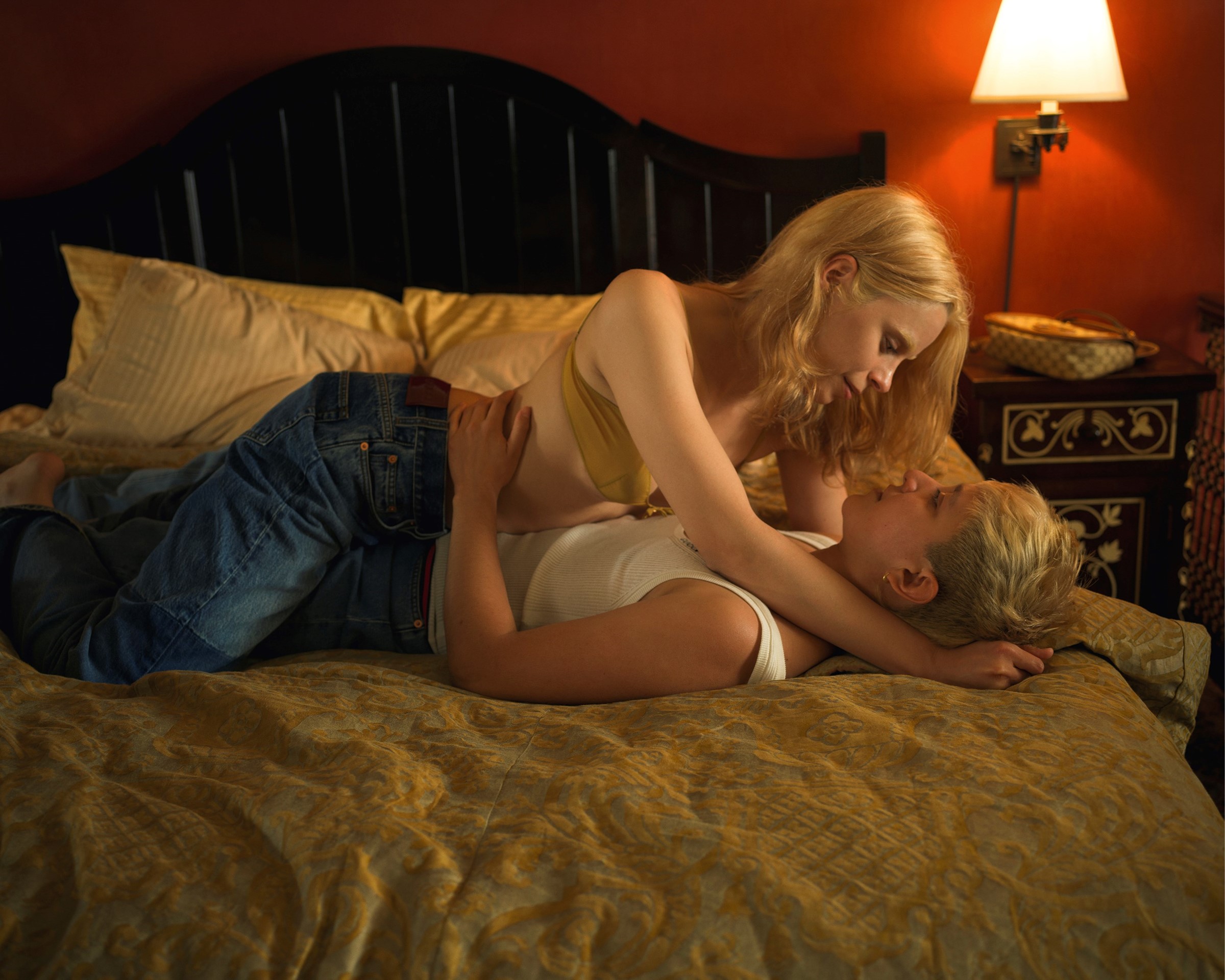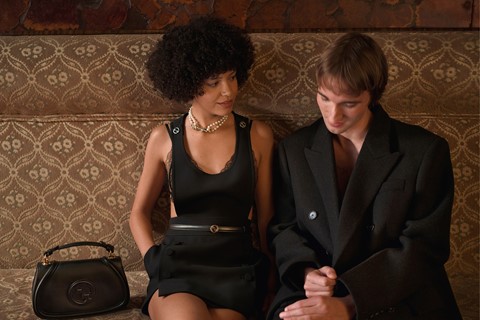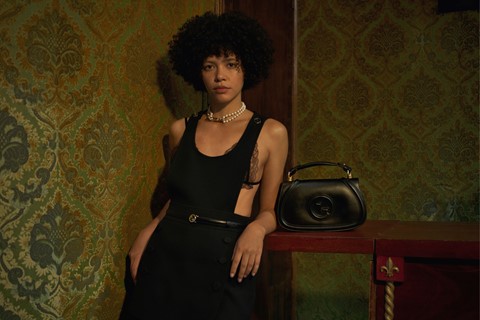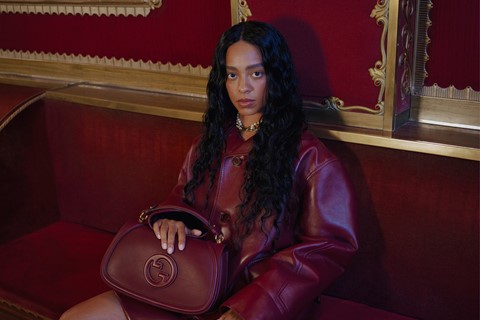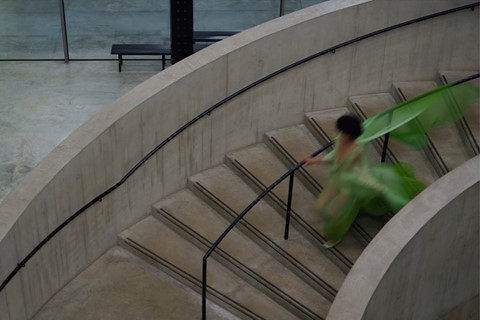Susannah Frankel: How was the experience of photographing this campaign for you?
Nan Goldin: It was amazing. I was given so much free rein. I didn’t expect that at all. I demanded it, I guess, and I can be pretty scary. And I had my team very close to me. Normally, I don’t let the client on set, it was one of the first times I’ve allowed that, but I was fine with Sabato, and Riccardo, his right hand, being there. They allowed me to choose the models, to do the casting in preview with my friends. We shot in London for two days and then did an extra day in LA. I did a casting call which I love to do. I never did a big campaign before. This is like a dream.
SF: I’m guessing you know Debbie Harry and you also cast Kelsey Lu.
NG: Debbie, I hadn’t seen for a long time. We had a very close friend, Glenn O’Brien, who passed away a few years ago and we were involved with each other at that time, but we hadn’t seen each other since. We’re both kind of shy. But she was lovely. I grew up on her. I first saw her perform in 1976 I think, in Boston. I have the utmost respect. And she gives a lot. She’s very forthcoming, kind and accommodating. Lu I know well. She is amazing, of course. Beautiful. I shot her for something else before. And she’s a riot. She’s one of those people who can find the fun in anything. And then I found these two couples in LA. One was a lesbian couple. They are models and influencers. I didn’t even know what an influencer was before I met them. I was astonished to learn that someone could spend their lifetime and make their money doing that.
SF: It’s incredible, isn’t it. If only we’d known.
NG: No, please, if only they knew. Oh my god. I’m very late coming to social media. I didn’t discover it till 2017 so I still don’t understand it entirely. The second couple were a trans woman and a trans man, Massima Bell and Gabriel Gamboa. Massima Bell produced an album, TRANSA, celebrating trans people, three-and-a-half hours of music, featuring over 100 artists, that’s being released in November. Their tenderness towards each other on the shoot … I never saw people love each other so much. They were in bed, making love to a certain extent. And I just never saw such tenderness. At the end of the shoot, everyone cried.
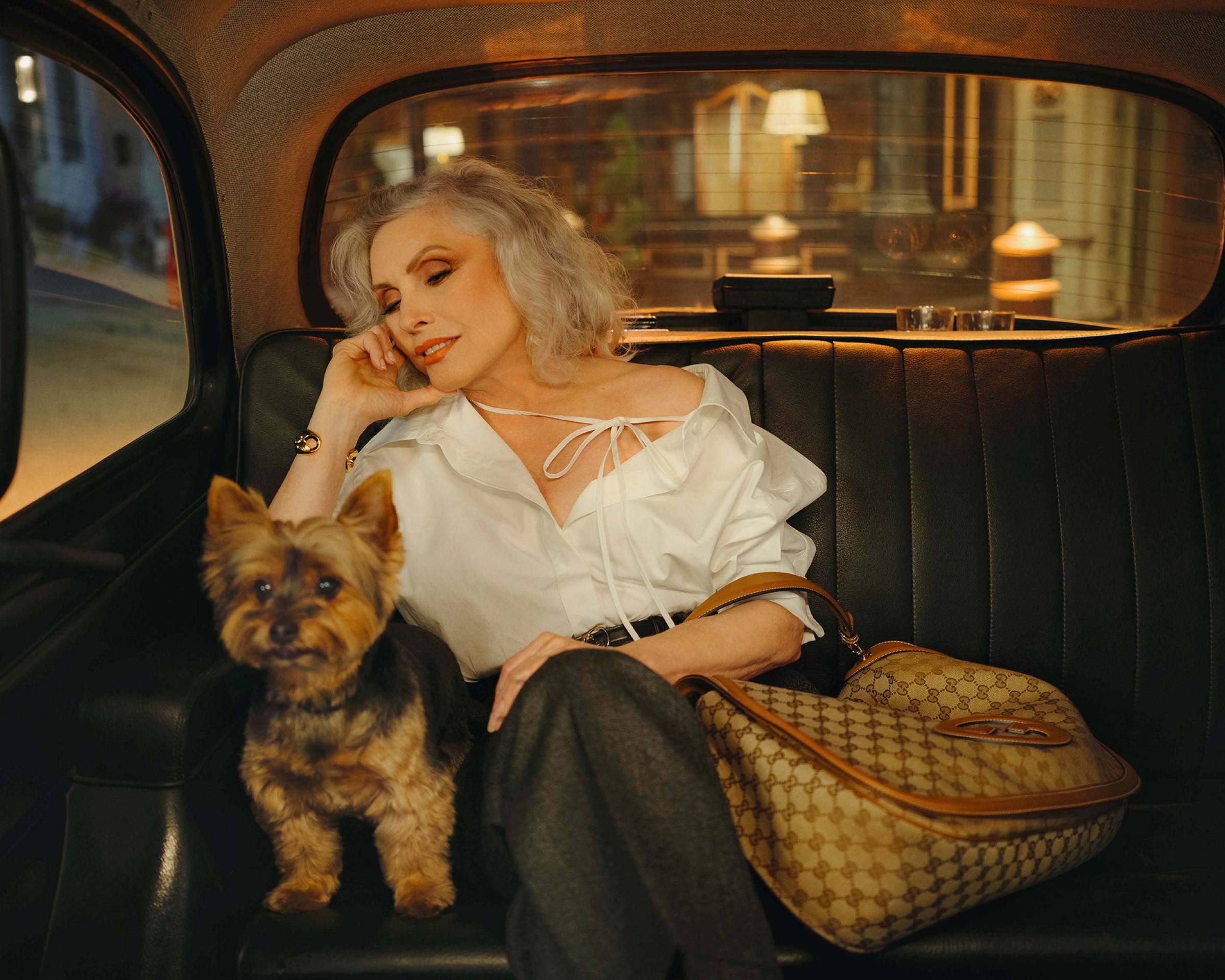
SF: For a Gucci campaign that’s something.
NG: Yes. The greatest love that the human species has attained was on a Gucci shoot.
SF: When you first started working in New York, in the 70s, no one really spoke about gender fluidity, it wasn’t talked about or named.
NG: Real fluidity doesn’t need a name. I grew up around the queens, in the 70s, they were the subject of my earliest work, and they were pioneers. They couldn’t go out of the house in the daytime they were so harassed. Gay men hated them, lesbians hated them. They were completely alienated from everyone but themselves. In the 70s life was the bar, that was where people were safe, they didn’t go anywhere else. Home to the bar, the bar back home. I love the word queen. The old timers still love that word, it’s a word of homage. Language is a tricky thing now and I hate that. Still, we have come a long way. The thing that’s happened is there isn’t so much shame around it, it’s not stigmatised so much, in certain cities at least. But now there’s a big pushback in America against trans people that’s really scary.
SF: What do you think attracted you to that community in the first place?
NG: I have no clue what attracted me to the queens, why I fell in love with them. I just saw the queens and thought they were the most beautiful people on earth and that was it. My best friend David Armstrong, who I grew up with from the age of 14, did drag for a minute in the 70s and he introduced me to a lot of people. He was so beautiful and androgynous which was very radical at the time.
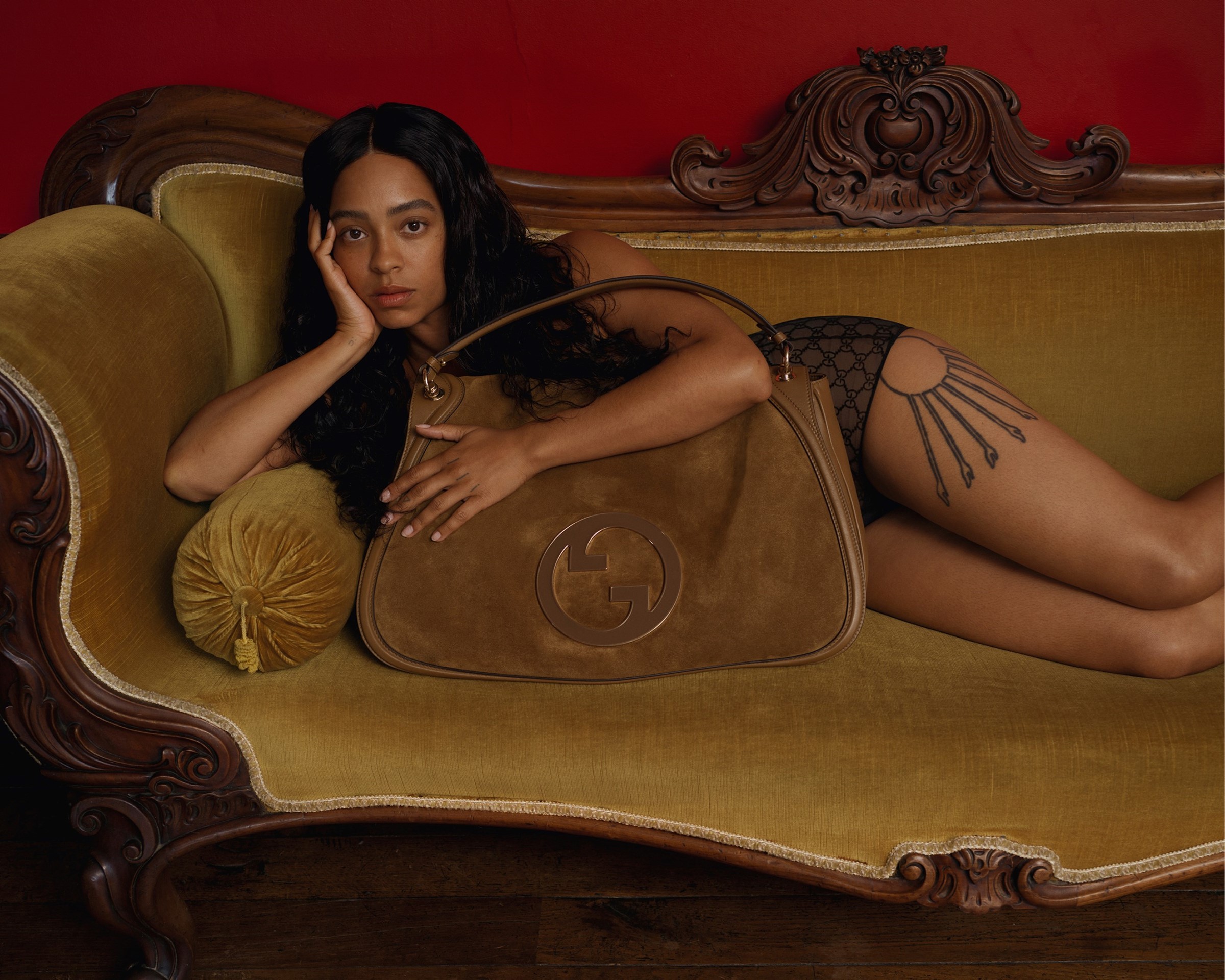
SF: There’s generally a perception that your aesthetic is raw – real, for want of a better word – whereas Gucci is among the glossiest names in fashion, about shine and size and scale and the juxtaposition between those two, apparently contradictory worlds is super interesting.
NG: They took a big chance on me. Sabato is finding his way and I think it is very courageous of him to have used me.
SF: I think you’re being modest.
NG: I mean it. I’m not a fashion photographer at all. It’s crazy that I was able to preserve my own intensity, intention and connection with people, that I could work like that for this campaign. I also insisted on having animals on the shoot, I had dogs on set all the time. I didn’t want to shoot without animals. I just made a film about animals for a new Gagosian show. [You never did anything wrong, September 12–October 19, 2024, Gagosian West 21st Street, New York]. We made it on 16mm film. I learned that there are ancient myths in many cultures that the sun is stolen by the animals and that causes a total eclipse. The piece is about the end of humanity and animals taking over the world. It’s my first abstract piece, it’s emotional and apocalyptic.
“I have no clue what attracted me to the queens, why I fell in love with them. I just saw the queens and thought they were the most beautiful people on earth and that was it” – Nan Goldin
SF: What is your interest in fashion? Are you interested in fashion?
NG: Politically I don’t know. I have a lot of feelings about the industry but, for me, fashion is still the queens from the 70s and their obsession with old movies. We bought clothes at Goodwill every day. One of my friends found a Fortuny gown for $3.95. So I grew up with that sense of old Hollywood fashion, real beauty. And I still love that. I love people dressing up. I love what it does to them and how it makes them feel. Anything that makes people feel good about themselves …
SF: You are known for making people look beautiful. And the strength, beauty and individuality of this cast bring the clothes to life.
NG: I think it works. I brought Lu on. And we cast Alaato, she’s Sudanese. I brought on a friend named Clare and her boyfriend Dylan, a young couple, and a Brazilian friend of my German assistant. And Francis, who is my chief assistant and archivist. He has a Renaissance face. I had them learn the Madison, an old dance from Godard’s Band of Outsiders, so they’re doing the Madison in the club. We shot two days in London and one in LA. In LA we shot on the Universal backlot which was so exciting. The Edith Head building. Edith Head, I worship. As someone who grew up with that version of Hollywood … People put down the Oscars but, to me, I still believe in Hollywood in the 40s and 50s, the Golden Age.
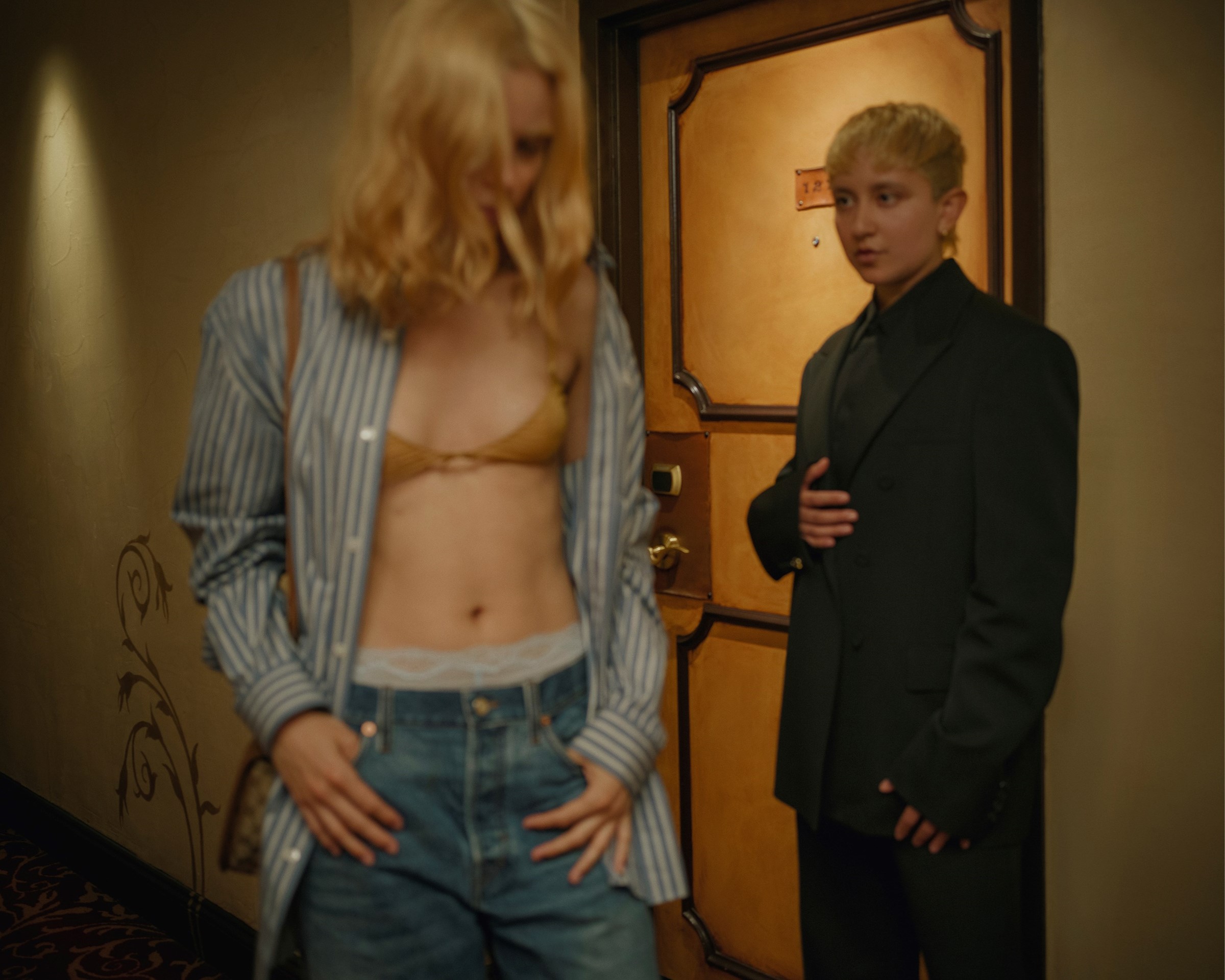
SF: At its best fashion has the same effect on people as those movies.
NG: True. I never thought of that, I love it. I used to feel fashion was destructive to women’s bodies because no one can attain that level of thinness after the age of 20. But now that’s changing. Many more bodies are acceptable and that’s huge.
SF: When you get a call about a commercial job, how do you feel?
NG: My feeling was that I didn’t know if I could do it. My work is not commercial. That’s scary to me. I had no idea how much work it was after the shoot, and I was in the middle of creating my big show. And it was hard for me to do this at the time of this war that I am so engrossed in, so obsessed with, so that was hard. But I needed to do it. And I’m happy I did it. I’m thrilled to see the big billboards.
SF: You’re a shy person and then you see your images on a huge billboard.
NG: I know. The camera gives me a voice. The good pictures are when I make a connection with the person, that is the bottom line of my work, eye to eye, and what I see there. That, and making people feel beautiful.
SF: That is very important to you.
NG: It is. And I think I succeeded. I hope I give people a sense of how beautiful they are that even they didn’t know.
SF: That is quite a quality.
NG: That’s my gift.
